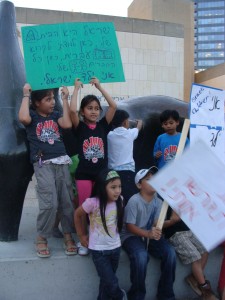 Palestine Note, May 27, 2010
Palestine Note, May 27, 2010
More than 6000 demonstrators gathered in the Tel Aviv Museum courtyard Tuesday night to protest the planned deportation of approximately 1200 children of illegal migrant laborers.
The event came in the wake of the news that the governmental committee, convened to determine the children’s fate, had decided to recommend permanent residency. It is unsure exactly what constraints would be placed on eligibility.
Another question mark is whether or not Interior Minister Eli Yishai will agree with the ruling. Despite harsh criticism from both the public and members of the Knesset, Yishai has stood by his decision to deport the children and their families.
Yishai is expected to rule on the committee’s recommendations next week.
With the expulsion planned for the end of the school year, Tuesday’s protest—organized by the grassroots movement Israeli Children, UNICEF Israel, and Israel’s National Student Union—was an emotional appeal to the government to cancel the imminent deportation.
Under the banner of “We don’t have another country,” the children and their raised signs that read “Don’t deport us,” and “Children of Israel.”
Dozens of the 1200 kids slated for deportation took to the stage and, in fluent Hebrew, sang “I don’t have another country”, a patriotic Israeli song known by most schoolchildren.
Journalists Guy Meroz and Orly Vilnai acted as hosts. Speakers included Israeli Children founder Rotem Ilan, Chairman of UNICEF Israel Moriel Matalon, Knesset Members Nitzan Horowitz (Meretz), Dov Khenin (Hadash), and Minister of Minorities Avishay Braverman (Labor), amongst others. Several musical acts performed, as well.
Addressing the crowd, which some estimated to be as high as 8000, Ilan said, “Those supporting the deportation, led by Interior Minister Eli Yishai…”
The demonstrators booed, as they did throughout the evening any time Yishai’s name was uttered. Ilan nodded and remarked, “He deserves it.”
“[Yishai and his supporters] are speaking all the time of what frightens them about foreign workers. But I want to explain to them today what frightens me…
“It frightens me to live in a society that brings a human [to Israel] but treats them like machines. It frightens me that our country hasn’t learned how to treat a foreigner. It frightens me that xenophobia is developing in our society encouraged by a government campaign. It frightens me that the country is considering deporting and arresting innocent children…”
But seeing the crowd before her and considering the strides her small, volunteer-based organization has made, Ilan said, “It gives me hope that it’s still possible to make a change in Israeli society.”
Looking on, Teresa, a Filipino worker who faces deportation along with her husband and their five-year-old son remarked that she was deeply touched by the both the event and the support of the Israeli public. She pressed her hand to her heart as she searched for the words.
Finally, switching from English to Hebrew, Teresa said, “I’m very happy to know that a lot of Israelis love us.”
It has been a difficult period for Teresa and her family since the Oz Unit, the strong arm of the Population, Immigration, and Border Authority, took to the streets in July. Of the possible deportation, Teresa said, “It will be very hard for him. Always I am asking him if he wants to go to the Philippines and he says ‘no.'”
Like many of the 1200 children, Teresa’s son attends an Israeli kindergarten and speaks only English and Hebrew. His favorite holiday, Teresa remarked, is Hanukah.
“Israel won’t deport children. Period. Never,” Meroz declared.
Speaking to Palestine Note, Ilan remarked, “[The children] are absorbed into Israeli society. They speak Hebrew; they celebrate the [Jewish] holidays.” Ilan pointed out that the children are enthusiastic participants in the scouts and youth movements, activities popular with Israeli youth.
“They don’t even speak Taglaog,” Ilan added, referring to the fact that most of the parents of the 1200 children are from the Philippines. Many are single moms who lost their legal status due to an Israeli policy that forbids foreign workers from giving birth in the country, forcing them to choose between their visa and their baby.
In regards to this policy, Ilan remarked, “These regulations are cruel and shouldn’t be in any moral country.”
Photo: Mya Guarnieri. Green sign reads “Israel is my home. Here I learned to read Hebrew. All my friends are here. I am an Israeli child.